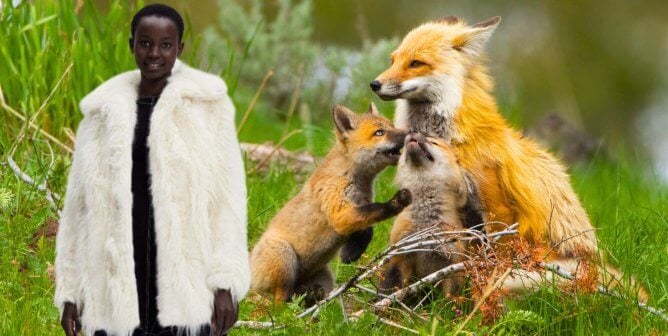The Fur Industry Is Dead: Here’s Where Fur Has Been Banned
Israel was officially the first country to ban the retail sale of fur. Estonia’s Parliament passed a bill making fur farming illegal as of January 1, 2026. The Ann Arbor, Michigan, city council voted to ban fur sales 10-0 in August 2021, making it the first city in the Midwest to ban the sale of new fur products. In October 2022, Cambridge, Massachusetts, became the fifth Bay State community to vote in favor of banning the retail sale of new fur products, following fur bans in Brookline, Plymouth, Wellesley, and Weston.
These progressive shifts are further proof that people everywhere are recognizing that the fur industry is violent and abusive. No animal should ever be forced to endure a painful death, yet 100 million of them are killed each year so that people can wear their fur.
These influential countries and localities with fur bans are leading the way!
Fur-Farming Bans
Austria
The last fur farm in Austria closed in 1998. In 2004, six of the nine federal states in Austria banned fur farming, and the remaining three began to enforce such strict animal-welfare regulations that fur farming became economically unfeasible. In 2005, the Federal Animal Protection Act was enforced, thus making it illegal to use animals purely for fur production and ensuring that no fur farms would open in the country.
Belgium
In 2018, the Flemish government of Belgium adopted a decree to end fur farming, with a phase-out period, following bans in Wallonia in 2015 and Brussels in 2017. This historic decision signified the end of fur farming there, and the country’s last remaining mink farms shut down in 2022.
Bosnia and Herzegovina
In 2009, Bosnia and Herzegovina passed an anti–fur farming law that prohibited raising animals for their fur by the end of 2018. In 2017, the deadline was under threat of being extended another 10 years, but thanks to sustained activism—including a letter from PETA Honorary Director Pamela Anderson—members of the country’s House of Peoples rejected the decision to postpone the ban and it went into effect in January 2018. However, another meeting took place and the phase-out period was extended another 10 years.
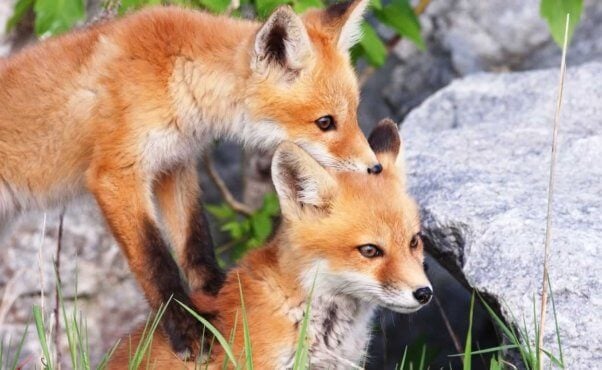
Bulgaria
In June 2022, Borislav Sandov, Bulgaria’s deputy prime minister for climate policies and minister of environment and water, announced a ban on the farming and importation of American minks throughout the country. This victory follows years of activities by PETA entities to support a fur-farming ban in the country. In 2018, PETA Germany supported the Bulgarian NGO CAAI with its anti-fur campaign and organized a demonstration. In 2020, PETA U.K. sent a letter to Bulgarian Minister of Agriculture, Nature, and Food Quality Carola Schouten urging her to ban mink farming, and that same year, PETA Honorary Director Pamela Anderson sent a letter to the Bulgarian Parliament asking for a ban on fur farming.
Croatia
Croatia’s Ministry of Agriculture listened to the concerned public and animal rights groups, including PETA, and decided in 2006 to ban fur farms. After a phase-out period of 10 years, the ban went into effect in January 2017.
Czech Republic
In 2017, the Czech Republic passed an animal protection law to end fur farming by January 2019. PETA Germany supported OBRAZ—the local group working toward the ban—with financial assistance, information, and expert testimony.
Estonia
Estonia’s Parliament passed a bill in 2021 to make fur farming illegal as of January 1, 2026.
Republic of Ireland
Following a 2019 commitment from the Irish government to phase out fur farming, the Emerald Isle is set to ban the practice officially in 2022.
Italy
In a landmark vote, the Italian Senate voted to ban fur farming by June 2022, following a temporary ban related to COVID-19 outbreaks on mink farms. The vote, which is expected to be ratified by the Italian Parliament before the end of the year, will see all remaining mink farms shut down within six months. The legislation includes compensation for farmers as they make the switch to humane materials.
PETA entities helped push for this compassionate decision with the help of nearly 55,000 supporters who urged the Italian government to shut down all cruel mink farms permanently. PETA entities also staged eye-catching protests, launched billboard blitzes, and enlisted the help of some of Italy’s most beloved celebrities to help push this issue forward. In a letter to Italian Prime Minister Mario Draghi, PETA U.K. noted that an estimated 91% of Italians are already against killing animals for fur.
Japan
In 2006, Japan passed the Invasive Alien Species Act, which restricted the breeding of the non-native species American mink, raccoon, and coypu. The act essentially outlawed fur farming, and 10 years later, the last fur farm in the country shut down!
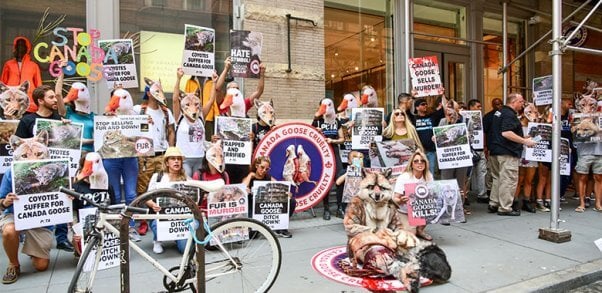
Lithuania
In September 2023, a ban on fur farming was signed into law—making Lithuania the 20th European country to reject the cruelty of fur. The country will phase out fur farms by 2027 and offer existing ones a compensation scheme that encourages them to close sooner.
Luxembourg
Luxembourg’s progressive animal welfare law was passed in June 2018 and has prohibited fur farming entirely since October 2018.
Norway
Norway introduced a total ban on fur farming in 2018, with plans to phase out fur farms entirely by 2025. By 2021, there were only six mink farms left, and in January 2023, the last two fur farms permanently shuttered, ending the fur-farming industry in the country entirely. The ban followed the release of a PETA exposé showing horrific conditions on fur farms there.
Republic of North Macedonia
The Republic of North Macedonia introduced a three-year phase-out period of fur farms in 2014, making fur farming illegal as of 2017.
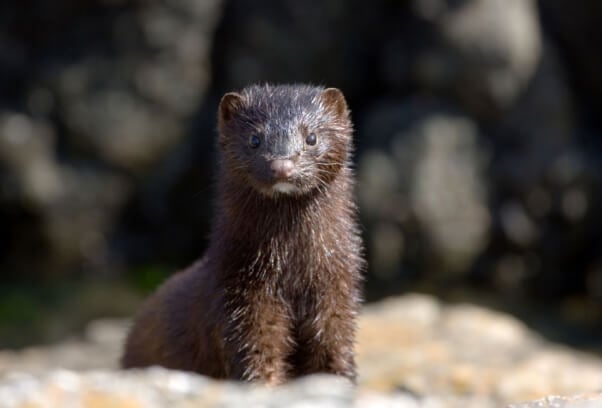
Serbia
Serbia decided to ban fur farming in 2009, giving farmers a 10-year phase-out period ending in January 2019. Throughout this period, the Serbian government was heavily pressured by the fur industry to delay implementing the ban or outright cancel it. But animal advocacy groups fought back. PETA Germany worked with local animal rights organizations to ensure that the ban moved forward and teamed up with Serbian singer Jelena Karleuša, who took a strong stand with an “I’d Rather Go Naked Than Wear Fur” campaign.
Slovakia
In 2019, the National Council of the Slovak Republic passed a ban on fur, making Slovakia the 15th European country to do so. The complete phase-out period (applying to existing fur farms) is expected to last until 2025.

Slovenia
In 2013, Slovenia passed a progressive animal-protection law that banned the farming and hunting of animals for their fur and hides. Existing farms were given a three-year phase-out period.
United Kingdom
The United Kingdom was the first country to ban fur farming, which it did in 2000 in response to overwhelming public support for ending the cruel practice of breeding and killing animals for their fur. The ban initially extended only to England and Wales, but Scotland and Northern Ireland joined in 2002. Now, following a campaign by animal protection groups, including PETA U.K., the U.K. is closer than ever to becoming a fur-free zone—and a ban on fur imports is expected to be included.
Importation and Sales Bans
Ann Arbor, Michigan
In a sweeping 10–0 vote, the Ann Arbor City Council voted to ban sales of fur. “This is yesterday’s business,” said Council Member Jeff Hayner. “Furriers need to go the way of the buggy-whip makers, you might say. And they will and they are, and the world will be better for it.” Prior to the vote, PETA submitted a statement of support and spoke in favor of the ban. We also mobilized supporters in the area to attend the hearing and speak out.
Berkeley, California
The city of Berkeley, California, passed an ordinance in 2017 prohibiting the sale of fur from all species of fur-bearing animals. The city council received a Compassionate City Award from PETA in honor of its initiative.
Brookline, Massachusetts
Student activist Ezra, the organizer for the Boston hub of Students Opposing Speciesism, led a successful, months-long fur-free campaign in this Massachusetts community. PETA also helped support the passage of a local bylaw banning fur here by e-mailing our members and supporters in the town and encouraging them to urge the Brookline Town Meeting Members Association to vote in its favor. Ezra attended numerous meetings on the issue, informed countless locals about the ban’s importance, and even spoke to state government officials.
California
California has housing requirements for minks and foxes that make the cost of fur farming prohibitive. In September 2019, it became the first state to ban fur trapping. One month later, it also passed legislation that will ban the sale and manufacture of new fur clothing and accessories beginning on January 1, 2023. These monumental victories came after appeals from a coalition of organizations, including PETA, and local activists—including some 8,000 PETA supporters—who wrote to their representatives in support of the legislation to help rid the Golden State of the ugly fur trade.

Cambridge, Massachusetts
On October 24, 2022, the Cambridge City Council voted unanimously to ban new fur sales, effective January 1, 2023, after supporters of PETA and other animal protection organizations contacted the council in favor of the ban. Cambridge joins four other Massachusetts communities in banning fur, citing egregious cruelty, environmental responsibility, and public safety in the wake of the COVID-19 pandemic.
Hallandale Beach, Florida
This Florida community became the first in the state to ban the sale of new fur products.
India
In 2018, India passed a ban on seal fur, joining the U.S. as well as Belarus, Kazakhstan, Mexico, Russia, Switzerland, Taiwan, and the 28 countries of the European Union. This victory for seals came after more than a decade of work by PETA India. The country also has a ban on the importation of chinchilla, mink, and fox fur.
Israel
On June 9, 2021, Gila Gamliel—the minister of environmental protection at the time—signed into law a bill that makes Israel the first country in the world to ban the retail sale of fur. The historic ban follows years of efforts by local activists, PETA, and PETA Honorary Director Pamela Anderson, who personally lobbied government officials in Tel Aviv and appealed to then–Prime Minister Benjamin Netanyahu to support a ban on fur. The proposal received overwhelming support from Israelis (86%).
Lexington, Massachusetts
A ban on the sale of new fur products in Lexington, Massachusetts, passed unanimously at the annual town meeting in March 2023. The legislation will go to the state’s attorney general to be signed into law.
Los Angeles
Following PETA’s ceaseless efforts, which included petitions, protests, several fur investigations, and celebrity anti-fur ad campaigns, the city of Los Angeles voted to ban the sale of fur products. The ban went into effect in 2021.
Plymouth, Massachusetts
Following a community effort led by activist Lauren Nessralla, the town of Plymouth voted to ban the sale of fur products in April 2022. Following approval from the attorney general, this ban will go into effect no earlier than May 1, 2023. This victory also came after PETA sent e-mails to conscientious folks in the area, encouraging them to contact town leadership to urge them to vote in favor of the ban.
San Francisco
In March 2018, the San Francisco Board of Supervisors voted unanimously to ban fur following weeks of tumultuous debate between animal rights activists and retailers. This historic victory for animals came after appeals from PETA and local activists, who attended numerous committee meetings on the issue and held a city hall rally just a few weeks prior to the ban, which went into effect at the start of 2019.
São Paulo, Brazil
São Paulo, the largest city in Brazil, passed a historic law in 2015 banning the importation and sale of all fur items. The year prior, city leaders had signed a law banning fur farming.
Wellesley, Massachusetts
In October 2020, officials in the town of Wellesley voted to ban new fur sales, making it the first U.S. locality outside of California to do so. The ban will go into effect in October 2021.
West Hollywood, California
In 2011, the West Hollywood City Council approved a ban on the sale of new fur jackets, vests, stoles, and boots in stores within city limits. The ban, which went into effect in 2013, made West Hollywood the first U.S. city to ban the sale of fur. Prior to the decision, the council was bombarded with calls, letters, and e-mails from PETA supporters, both local and from outside the city, urging it to pass the measure. Following the ban, PETA named West Hollywood the Most Compassionate U.S. City of 2011.
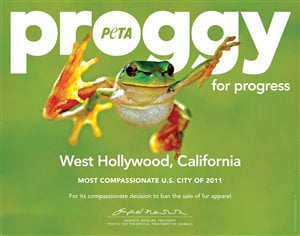
Weston, Massachusetts
In May 2021, the town of Weston became the second locality in the state to pass a fur sales ban, joining Wellesley. If the Massachusetts attorney general approves this measure, fur sales will be banned starting in November 2021.
Partial Bans
Denmark
Denmark adopted legislation in 2007 to improve the welfare of fur-bearing animals that included a number of welfare improvements for foxes on fur farms. In 2009, the country passed a ban on fox farming, with a phase-out period lasting until 2017 for a majority of farms and until 2023 for those earning their main income by farming foxes.
France
In 2020, France announced a gradual ban on mink fur farming, with a five-year phase-out period—and new mink farms are prohibited from opening.
Hungary
In 1998, Hungary passed the Animal Protection and Tolerance Act, which states that “animals shall not be killed for reasons and under circumstances that are unacceptable or intolerable.” However, the act was not applicable to fur farming until later modifications were made. In November 2020, Hungary banned the breeding of minks, foxes, polecats, and coypus for fur following concerns about animal welfare and outbreaks of the novel coronavirus on mink farms across Europe. Unfortunately, the list of protected animals doesn’t include angora rabbits or chinchillas.
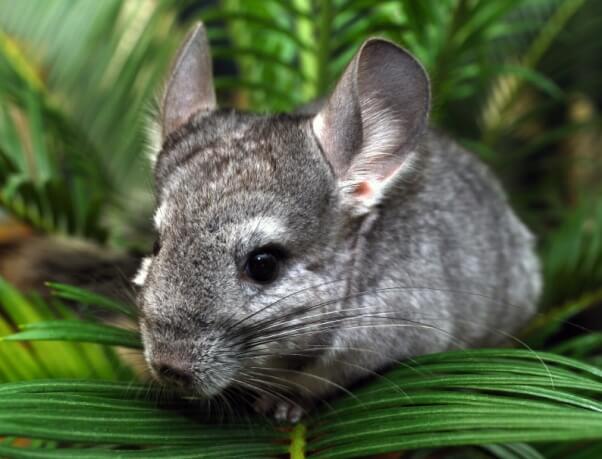
Islington, London, England
In October 2019, Islington Council passed a ban on fur sales at street markets. This is the first London council to ban fur and the second in the U.K. The ban went into effect in January 2020.
Netherlands
The country’s Parliament voted overwhelmingly in favor of banning the breeding of minks by the end of 2020 after COVID-19 was recently transmitted from minks to humans on Dutch fur farms. This follows appeals and protests by PETA Netherlands, local groups, and Party for the Animals demanding that the deadline for fur farm closures, which had been set for 2024, be brought forward. Allowing mink farms to maintain business as usual for nearly four more years—in the face of a global crisis stemming from animal exploitation—would have been inexcusable from the perspective of both the risk posed to humans and the harm inflicted on minks.
New Zealand
In 2013, New Zealand passed a prohibition on the importation of minks, which effectively bans mink farming there. However, the country still allows fur farming of ferrets.
Oldham, Manchester, England
In 2018, Oldham became the first council in the U.K. to ban the sale of fur on council land and at its markets.
Romania
In October 2024, the Parliament of Romania in Bucharest voted to amend the law to ban the breeding, keeping, and killing of chinchillas and minks for fur, effective January 2027.
Spain
In 2016, Spain adopted stricter regulations to prevent ecological damage caused by minks escaped from fur farms. Since then, building new mink fur farms in Spain was prohibited, as the American mink is a serious threat to biodiversity as an invasive alien species.
Stricter Regulations
Germany
Leaders of Germany voted in 2017 for stricter regulations (with a transition period of five years), putting a major strain on fur farming. As a result of those regulations and pressure from the public, the country’s last fur farm shut down in April 2019 and fur farming in the country ended. After PETA Germany was founded in 1994, it determinedly lobbied for a national ban on fur farming, created anti-fur petitions, and conducted several investigations, protests, and celebrity anti-fur ad campaigns—all of which finally led to the passing of this legislation.
Sweden
Sweden’s Animal Protection Ordinance, passed in 1995, prohibits caging foxes and requires that they have the opportunity to be active, to dig, and to socialize with other foxes. Following the ordinance, fox farming was no longer economically viable in Sweden, and the remaining fur farms have shut down. Sweden’s last chinchilla farm closed down in November 2014, and with fox farming already phased out, the only animals remaining on Swedish fur farms are minks. However, the country is temporarily banning the breeding of minks in 2021 in order to prevent the risk of mutations of the novel coronavirus.
Switzerland
Switzerland’s legislation allows animals to be kept captive only in conditions that are equivalent to those required in modern zoos. Therefore, as of 2008, fur farming became unprofitable and no longer exists in the country.
*****
With all this progress, it’s clear that using animals for fur is a thing of the past. And these regions of the world aren’t the only entities declaring that fur is dead: Just since May 2017, Coach, Burberry, Gucci, Michael Kors, Versace, Furla, BCBG, and Diane von Furstenberg have all banned it following years of PETA’s efforts. Dozens more—including INTERMIX, Gap Inc., H&M, Inditex (the owner of Zara), Banana Republic, Ralph Lauren, Calvin Klein, Tommy Hilfiger, Giorgio Armani, and Vivienne Westwood—had already recognized that fur belongs on its original owner. And most recently, Saks Fifth Avenue, Valentino, Canada Goose, Dolce & Gabbana, Oscar de la Renta, and Neiman Marcus also banned fur.



